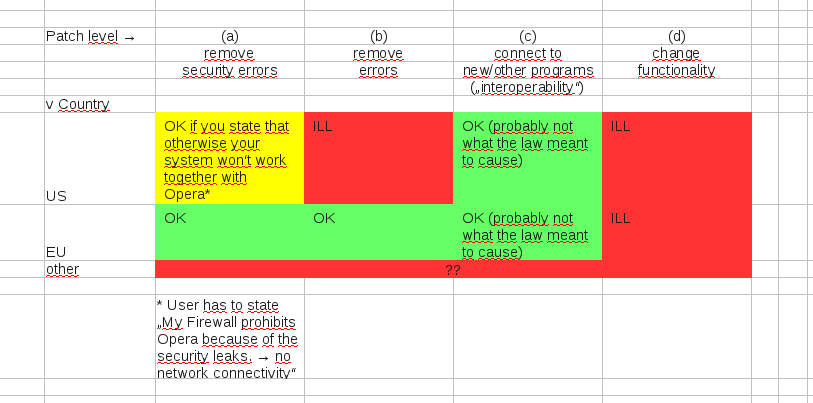
Once upon a time a nice program existed: the Opera browser based on the Presto rendering engine. Not everything was fine with it but many people liked it.
Then the Opera (management?) team decided that it was too expensive to maintain/develop an own rendering engine and that it was better to drop the old one in favour of Googles' Engine, Chrome.
But the people who liked Opera/Presto did not stop to like it. (I call them dreamers in the next paragraph ...)
About one time every year I asked the search engine for the "ancient" opera source. Usually there was no result despite of some new projects of those "dreamers" like Fifth and OtterBrowser. (Ironically when I tried Fifth it crashed when I visited the Fifth Github page :-) )
But this year the search engine told me that the Opera browser source was leaked which really can be considered quite exciting news!
On the official Opera (company) blog has appeared following post in January: https://blogs.opera.com/security/2017/01/legacy-opera-presto-source-code-appearance-online-sharing-sites/
>> PART_1 de 1.0Es war einmal eine Zeit, in der eine schönes Programm exisitetr hat: der Opera-Browser, der auf der Presto-Rendering-Engine aufgebaut hat. Der Browser hatte Fehler, aber viele Menschen haben ihn gerne gemocht.
Dann entschied das (Management-?)Team von Opera, dass es zu teuer sei, eine eigene Rendering-Engine fortzuentwicklen und dass es besser wäre, die alte (mitsamt des ganzen Browsers drumrum) wegzuwerfen und stattdessen auf Googles Engine, Chrome, zu setzen.
Aber die Menschen, die Opera/Presto gerne gemocht haben, hörten nicht auf, ihn zu mögen. (Ich nenne sie im nächsten Absatz "Träumer" ...)
Etwa einmal pro Jahr habe ich die Suchmaschine nach dem Quelltext des "alten" Opera-Browsers gefragt. Normalerweise gab sie kein Ergebnis zurück, wenn man von einigen neuen Projekten dieser "Träumer" wie Fifth und OtterBrowser absieht. (Als ich Fifth ausprobiert habe, ist er ironischerweise beim Besuch der Fifth-Github-Seite abgestürzt :-) )
Aber dieses Jahr hat mir die Suchmaschine vermittelt, dass der Quelltext des Opera Browsers geleaked ist, was ja doch als ziemlich aufregend bezeichnet werden kann!
Auf dem offiziellen Opera-Blog ist im Januar folgender Artikel aufgetaucht: https://blogs.opera.com/security/2017/01/legacy-opera-presto-source-code-appearance-online-sharing-sites/
>>TEXT enLegacy Opera Presto source code appearance in online sharing sites
Opera recently became aware that source code from our legacy browser engine, Presto, has appeared in some online code and file sharing sites. This code is the property of Opera Software and has been published illegally and without our permission.
[...]
While some of Opera’s products are not currently fully open source, Opera has great respect for the open source community.<< TEXT >> PART_2 en 1.0
I guess that they are right - much of their effords are open source. And I guess it is the right thing to keep the legacy product alive.
So I have made some thoughts on the future of Opera 12.15 (= last Opera Presto for Linux). Here are the results:
The result of the legal analyses is that in EU it is no problem to correct errors and provide those patches for the public. In the USA this is partly possible. The patches have to be user-appliable to the original Opera browser binary, respectively. I didn't research the other countries' situation.
My personal opinion is that all activity about Opera/Presto shall be as open and as public as possible! A web browser is an essential part of most computer systems and therefore shall be as well documented and reviewable as the Linux kernel or the GNU tools e.g..
At last here's the graphical version of the possible patch coverage as to be found in License_and_Patch_options.ods as well:

Ich denke, dass sie recht haben - sie haben viel Aufwand in Open-Source-Veröffentlichungen gesteckt. Und ich glaube, es ist jetzt das richtige, das alte Produkt am Leben zu erhalten.
Also habe ich mir einige Gedanken über die Zukunft von Opera 12.15 (d. h. die letzte Opera/Presto-Version für Linux) gemacht. Hier sind die Ergebnisse:
Das Ergebnis der Analye ist, dass es in der EU kein Problem ist, die Fehler zu korrigieren und die Korrekturen der Öffentlichkeit zugänglich zu machen. In den USA ist die Korrektur teilweise möglich. Die Patches müssen jeweils vom Nutzer auf die Original-Binary anzuwenden sein. Ich habe nicht die Situation in anderen Ländern recherchiert.
Meine persönliche Meinung ist, dass sämtliche Aktivität rund um Opera/Presto so offen und öffentlich wie möglich sein sollte! Ein Web-Browser ist ein essentieller Bestandteil der meisten Computersystem und sollte deswegen so gut dokumentiert und untersuchbar wie z. B. der Linux-Kernel oder die GNU-Tools sein.
Zu guter letzt noch die grafische Aufbereitung des möglichen Patch-Umfangs in den Ländergruppen, wie auch in License_and_Patch_options.ods zu finden:
